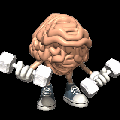179 - Gimnasia cerebral
Gymnastics|cerebral
179 - Gehirngymnastik
179 - Brain Gymnastics
179 - Gymnastique cérébrale
179 - Ginnastica per il cervello
179 - Smegenų gimnastika
LOCUTOR ¿No hace usted ejercicios para mantenerse en buena forma física?
HOST|No|||exercises||stay||||physical
ANNOUNCER Treiben Sie keinen Sport, um in guter körperlicher Verfassung zu bleiben?
ANNOUNCER Don't you exercise to keep yourself in good physical shape?
ANNONCEUR Ne faites-vous pas de l'exercice pour rester en bonne forme physique?
¿No sale a correr por las mañanas o va a un gimnasio?
|go||||||||||
Don't you go for a morning run or go to a gym?
CHICA ¡Claro que sí!
GIRL|||
GIRL Of course I do!
¡Yo hago aeróbicos!
I|I do|aerobics
¡Todos los días un buen rato moviendo el esqueleto!
|||||time|moving||skeleton
Every day a good time moving the skeleton!
Chaque jour un bon moment pour déplacer le squelette!
LOCUTOR ¿Y el cerebro?
CHICA El cerebro, ¿qué?
LOCUTOR Que el cerebro hay que ejercitarlo también.
|That|||||to exercise it|
CHICA ¿Y cómo ejercito el cerebro, dándome cabezazos contra la pared?
||||||me donnant|coup de tête|||mur
|||army|||giving me|headbutts|||wall
Und wie trainiere ich mein Gehirn, indem ich meinen Kopf gegen die Wand schlage?
GIRL And how do I exercise my brain, banging my head against the wall?
PERIODISTA Dos neurobiólogos, Lawrence Katz y Manning Rubin, de la universidad norteamericana de Duke, descubrieron a inicios de este siglo que, igual que el cuerpo necesita ejercicios para mantenerse en forma, el cerebro también.
||||||||||||||||au début|||||||||||||||||
||neurobiologists|Lawrence|Katz||Manning|Rubin||||||Duque|||beginnings||||||||||||stay|||||
JOURNALIST Two neurobiologists, Lawrence Katz and Manning Rubin, from Duke University in North America, discovered at the beginning of this century that, just as the body needs exercises to stay in shape, so does the brain.
Se trata de unos "aeróbicos de las neuronas" que dan agilidad intelectual, estimula la memoria, la creatividad y hasta la coordinación del cuerpo.
||||||||||||||||||jusqu'à||||
||||aerobics||||||agility||it stimulates|||||and|||coordination||
These are "aerobic neurons" that give intellectual agility, stimulates memory, creativity and even coordination of the body.
LOCUTOR La gimnasia del cerebro es una excelente ayuda contra la enfermedad de Alzheimer también conocida como demencia senil.
|||||||||||maladie|||||||
||||||||help|||||||||dementia|senile
ANNOUNCER Brain gymnastics is an excellent aid against Alzheimer's disease also known as senile dementia.
El Alzheimer no se cura.
||||cure
Pero sí se puede prevenir.
||||prevent
But it can be prevented.
CHICA ¡Pero no hable más y dígame cómo ejercito el cerebro!
CHICA Aber sagen Sie mir nicht mehr, wie ich mein Gehirn trainiere!
GIRL But stop talking and tell me how I exercise my brain!
LOCUTOR Muy fácil.
Cambiando las rutinas.
||routines
Changing routines.
CHICA Explicotéese mejor.
|Explain yourself|better
GIRL Explain yourself better.
LOCUTOR La mayoría de las cosas que hacemos durante el día son rutinarias.
||||||||||||routine
ANNOUNCER Most of the things we do during the day are routine.
Las hacemos siempre igual.
We always do them the same.
Esto tiene ventajas porque reducen el esfuerzo de nuestra mente.
cela||avantages|||||||
||||they reduce||effort||our|
This has advantages because they reduce the effort of our mind.
Pero tienen una gran desventaja: que el cerebro se acostumbra y se vuelve haragán.
||||désavantage||||||||devient|paresseux
||||disadvantage|||||gets used to||||lazy
But they have a great disadvantage: that the brain gets used to it and becomes lazy.
CHICA ¿Y qué ejercicios me recomienda para romper esas rutinas?
GIRL And what exercises do you recommend to break those routines?
LOCUTOR Hacer algunas cosas al revés.
||||à l'|
|||||backwards
ANNOUNCER Do some things backwards.
Por ejemplo, el simple hecho de cambiar de mano para cepillarte los dientes, obliga al cerebro a darse cuenta de lo que estás haciendo y eso lo estimula.
||||||||||te brosser|||||||||||||||||
||||fact||to change||||to brush|||forces||||||||||||||
For example, the simple act of switching hands to brush your teeth forces the brain to realize what you are doing and that stimulates it.
CHICA Buena idea.
A ver, dígame más ejercicios para la gimnasia cerebral.
Let's see, tell me more exercises for brain gymnastics.
LOCUTOR Escucha y apúntalos...
|||note-les
|||write them
LOCUTOR Ponte el reloj en el otro brazo... Y mira la hora ahí.
|Put on||watch|||||||||
ANNOUNCER Put the watch on the other arm ... And look at the time there.
Camina por la casa de espaldas... En China, esto se practica en los parques.
|||||arrière||||||||
|||||back||||||||
Auf dem Rücken um das Haus laufen... In China wird dies in Parks praktiziert.
Walk around the house on your back ... In China, this is practiced in the parks.
Promenez-vous dans la maison sur le dos ... En Chine, cela se pratique dans les parcs.
Vístete con los ojos cerrados... ¡Ojo, no te pongas los zapatos al revés!
habille-toi|||||attention|||||||
Get dressed||||||||put on||||backwards
Dress with your eyes closed ... Be careful, do not put your shoes backwards!
Estimula el paladar con sabores desconocidos.
||palais||saveurs|inconnus
||palate||flavors|unknown
Stimulates the palate with unfamiliar flavors.
Mira las fotos cabeza abajo... ¡las fotos, no tú!
|||tête|||||
Look at the photos upside down ... the photos, not you!
Cambia el camino para ir y volver del trabajo.
||||||return||
Change your way to and from work.
Trata de memorizar la lista del mercado.
||to memorize||||
Try to memorize the market list.
Compra un rompecabezas y hazlo... ¡Excelente gimnasia cerebral!
||puzzle|||||
||puzzle|||||brain
Buy a puzzle and do it... Great brain workout!
Los juegos de mesa, especialmente el ajedrez, el sudoku y otros que implican concentración, son estupendos para masajear nuestro cerebro.
|||||||||||||||formidables||||
||||||chess||sudoku||||involve|||marvelous||massage||
LOCUTOR ¿Ves?
ANNOUNCER See?
Son cosas muy sencillas.
They are very simple things.
Pero que desafían al cerebro a cambiar las rutinas de la vida cotidiana.
||défient||||||||||
||they challenge||||||||||daily life
But they challenge the brain to change the routines of everyday life.
CHICA ¡Desde mañana comienzo esos ejercicios!
|||I begin||
LOCUTOR Desde mañana, no.
Desde ahora mismo.
¿Sabes qué puedes hacer?
Do you know what you can do?
Envía este radioclip a tus amigos y amigas... pero haz el envío cambiando de mano el ratón de la computadora.
|||||||||fais||envoi|||||souris|||
|||||friends||||||shipment|changing|||||||
Send this radio clip to your friends ... but send it by changing your computer mouse hand.
¿Has practicado alguno de estos ejercicios?
|practiced||||
Have you practiced any of these exercises?

